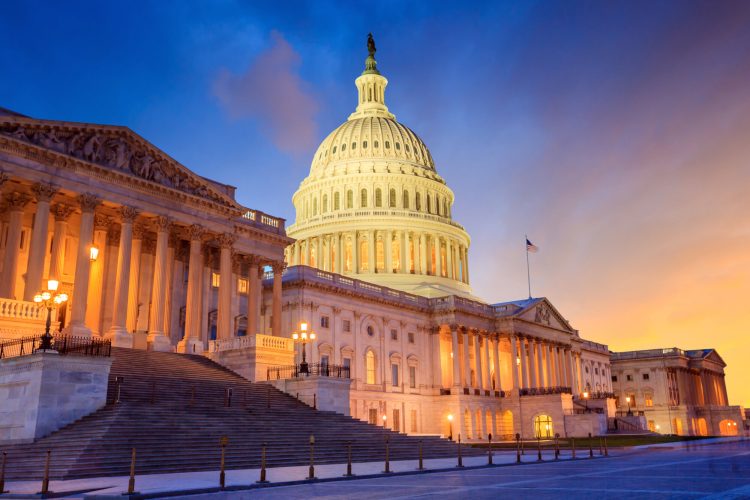On the latest Facing the Future, I was joined by former Congressman and Ambassador Richard N. Swett, Concord Coalition Executive Director Robert L. Bixby, Policy Director Tori Gorman and Senior Policy Advisor Josh Gordon. We discussed recent Congressional legislation enacted in response to the Coronavirus pandemic, what additional aid is being considered, challenges facing the Congressional Budget Office and health care cost growth trends.
[Note: In light of current circumstances, The Concord Coalition is posting additional online content. Portions of this week’s Facing the Future can be seen in the video clips posted below.]
Gorman said that, although Congress recently passed three major relief packages, more are likely on the way because unemployment is on the rise and GDP is contracting as the nation endures the COVID-19 pandemic and an economic “pause.”
“We are in the midst of an unprecedented health care crisis … Concord Coalition is on the record supporting the government’s efforts to sustain workers until it’s safe to reboot,” Gorman said. “More is needed from Congress.”
But Gorman also expressed concern that policymakers are considering legislative tactics that do not pass Concord’s fiscal responsibility test, referred to as the Three T’s: timely, targeted and temporary aid.
“In particular, Speaker Pelosi has suggested temporarily eliminating the cap on the deduction for State and Local Taxes … abbreviated SALT,” she said. “Concord Coalition is saying, ‘please don’t pass the SALT.’ ” Gorman objects to the proposal on the grounds that such a tax law change is not targeted to those most in need.
“President Trump has stated a desire to reinstate the deduction for entertainment and meal expenses … that proposal fails across the board,” she said. “Incentivizing companies to spend more money in restaurants that are closed until further notice is not necessarily a good way to get those businesses the liquidity they need.”
You can read Gorman’s take on the SALT cap and other policies being considered by Congress as potential additions to future relief packages in more detail by clicking here.
Swett said Concord has always advocated for fiscal responsibility, like balancing the budget and reducing the nation’s debt. He noted that steps taken by elected leaders to combat the Coronavirus and prop up the economy will likely widen budget gaps by trillions of dollars, which would be in addition to the structural deficit that existed prior to the pandemic.
“The years ahead of us are going to be all the more necessary to work doubly hard to ultimately reduce that debt and to bring down that deficit,” he said. “But right now, we have to care for people that are in dire need.”
Beyond the government’s help, Swett said that, while still abiding by social distancing guidelines, Americans need to help each other by finding ways to maintain personal connection and provide support.
Bixby discussed the challenges facing CBO in its obligation to score legislation and establish a baseline for its economic outlook. Bixby asked, “How do you assess an economy where 10 million people file for unemployment in a two-week period?”
He added that CBO has cautioned that any analysis it provides over the next few months will need to be taken, to some extent, with a grain of salt because of the immense amount of uncertainty throughout the economy, the workforce, the legislature and even the health care system. You can read more of Bixby’s thoughts on challenges facing CBO by clicking here.
Gordon shared insights provided by the Medicare and Medicaid chief actuaries with regard to where health care costs over the next 10 years were headed prior to the pandemic. “They said, as they normally do, that as a percent of GDP, our health care programs are going to grow faster than the economy.”
In light of the current health care crisis and economic slowdown, he said that if GDP falls off a cliff, even if health care spending maintained its current rate of growth, as a percent of the economy, it could have the appearance of an enormous increase. Gordon also said he does not think anyone really has a clue what will happen to health care spending as we progress through the pandemic. You can take a deeper dive into health care cost growth with Gordon’s analysis, here.
Bixby said, “the one thing that seems certain … is that the longer the pandemic lasts, the greater the effect on the federal budget deficit is likely to be.” But he emphasized that “step one” for the economy, the budget and the nation’s health is to fight the pandemic.
Hear more on Facing the Future. I host the program each week on WKXL, NHTalkRadio.com (N.H.), and it is also available via podcast. Join me and my guests as we discuss issues relating to national fiscal policy with budget experts, industry leaders and elected officials. Past broadcasts are available here. You can subscribe to the podcast on Spotify, iTunes, Google Play Music or with an RSS feed. And follow Facing the Future on Facebook.
Continue Reading










